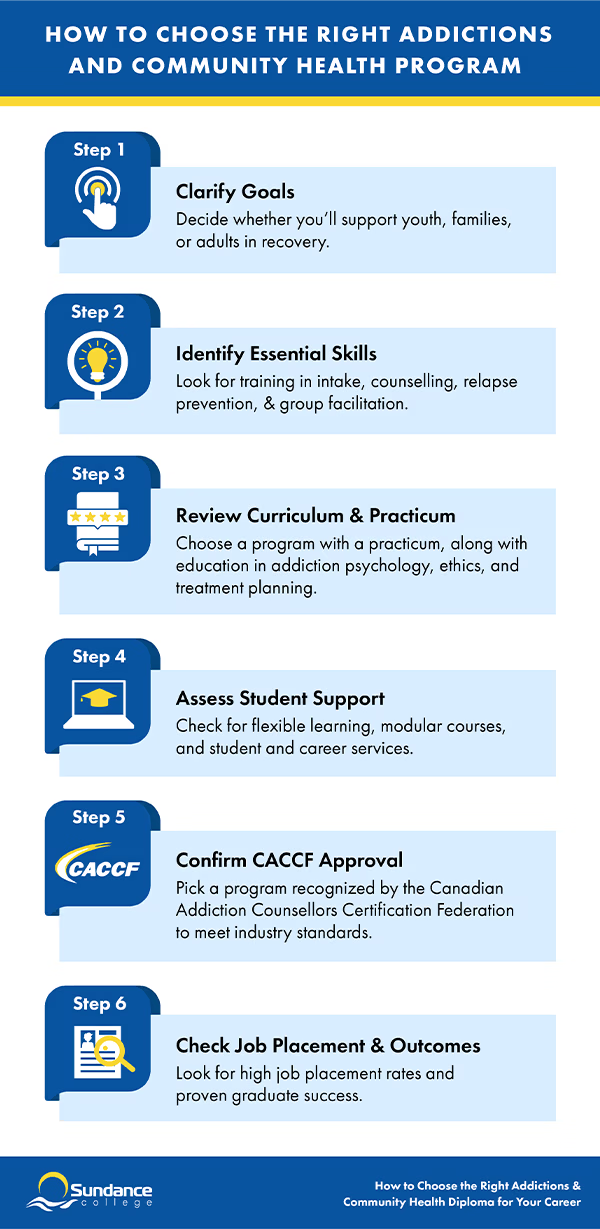Blog / How to Choose the Right Addictions & Community Health Diploma for Your Career
How to Choose the Right Addictions & Community Health Diploma for Your Career

Addictions and Community Health Professional Diploma
- Addictions Worker
- Youth Support Worker
- Family Support Worker
- Drop-in Centre Worker
Table of Contents
Everyone who chooses to work in addictions and community health has a story that led them to the field. For some, it’s the hard road of recovery. For others, it’s watching addiction affect families and communities up close or deciding to stand with people who are too often overlooked. Whatever your reason is, you’re here because you believe change is possible.
Turning that belief into a career starts with finding the right diploma program. The training you choose will influence how you connect with people, prepare you to respond in a crisis, and give you the tools to uplift communities.
Here’s how to choose an Addictions and Community Health Professional program that fits your goals.
Listen to: How to Choose the Right Addictions & Community Health Diploma for Your Career
Step 1: Clarify Your Career Goals Before Choosing a Program
Addictions & Community Health Professionals enjoy fulfilling careers in a variety of community health settings. As a professional in this field, you may have the opportunity to support youth or adults in their recovery from addictions. You might also find yourself working as a Community Service Worker in programs that support the homeless sector or those suffering from the effects of trauma, domestic violence, or substance abuse. The opportunities to support vulnerable populations in your community are plentiful.
Decide where you want to make the most difference and who you want to serve.
“After eight years clean, I knew it was time to help others the way people had helped me.”
– Leah B., Sundance College Addictions and Community Health Professional Graduate
For Leah B., personal recovery inspired a career in addictions and community health. Your own motivation might come from caring for a family member, seeing the need for support services, or a drive to build safer communities.
By clarifying your career goals early, you are choosing your path and preparing to fill roles where communities urgently need support.
Step 2: Identify the Skills You’ll Need & Match Them to the Program
In addictions and community health, you’ll work with people during the most difficult points in their lives. You might find yourself helping someone in crisis, supporting a person carrying the weight of trauma, or guiding someone working toward a fresh start.
To be ready for those moments, you need intake skills to assess a client’s situation, counselling strategies to build trust, relapse prevention & intervention skills to respond when safety is at risk, and group facilitation skills to guide sessions where people find strength in shared experiences.
These essential skills for addictions worker roles are most effective when they’re combined with knowledge of the current realities of addiction, the psychological factors that influence behaviour, and the ethical considerations that come with supporting people in vulnerable situations. The right diploma program provides skills in all these areas, so when you graduate, you are prepared to contribute immediately in agencies, shelters, or treatment centres that rely on trained professionals.
Step 3: Compare Curriculum & Practicum Opportunities
When reviewing diploma programs, pay attention to what you’ll learn in class and how you’ll put that learning into practice.
“The focus on psychology, communication, and counselling drew me in. Those were exactly the areas where I wanted to build my skills.”
– Stephanie R., Sundance College Addictions and Community Health Professional Graduate
The curriculum should provide hands-on training in key areas, including contemporary issues such as behavioural addictions, homelessness, family support resources, and harm reduction; psychological aspects like neuroscience, motivation and behaviour; ethical considerations including relationships and boundaries; intake procedures and treatment planning; and the needs of high-risk populations. This practical approach gives you an invaluable perspective on the challenges you’ll encounter and how to respond effectively.
A practicum takes that preparation further by placing you in the settings where this work happens every day. By working alongside professionals in a community mental health centre, outreach agency, or corrections facility, you’ll see how the skills you’ve developed can provide support and direction in someone’s recovery.
Step 4: Assess Student Support & the Learning Environment

Preparing for a career in addictions and community health takes commitment, which is why the support around you matters.
Look at how the program helps you balance academics with personal and professional responsibilities. Find out if student services are available when academic, personal, or financial challenges arise, and whether career services are introduced early so you receive guidance with resumes, interviews, and job searches during your studies and after graduation.
Choosing a program that integrates academic, personal, and career support helps you succeed in your studies and in the field.
Step 5: Confirm the College Program is Approved by CACCF
Before enrolling, make sure the program is approved by the Canadian Addiction Counsellors Certification Federation (CACCF), which is recognized as the gold standard both nationally and internationally. This approval confirms that the courses follow national standards and prepare you for the demands of working in addictions and community health.
Graduating from a program with CACCF approval gives you credibility with employers and supports your path to professional certification in addictions counselling. Your education will be recognized and respected, giving you a strong foundation as you begin your new career.
Step 6: Check Job Placement & Alumni Success
The right Addictions and Community Health Professional diploma program will set you up to start or advance your career.
Practical experience is a key part of that preparation, giving you the chance to learn from professionals and apply your skills in the field.
As Alberta’s Minister of Education, Demetrios Nicolaides, highlights, “Learning directly from mentors and seasoned professionals, while getting real-life work experience, is one of the best ways to set students up for success in their future careers.”
Sundance College graduates echo this connection between hands-on learning and career opportunities:
“My practicum at the John Howard Society gave me experience supporting people with homelessness, addictions, and mental health, and it led directly to my first job.”
– Jessica T., Sundance College Addictions and Community Health Professional Graduate
“After graduating, I became an Independent Living Facilitator, supporting youth in care as they transition to adulthood. The program gave me the skills and confidence to succeed.”
– Shelley B., Sundance College Addictions and Community Health Professional Graduate
These graduate outcomes show how quickly you can move from training into roles that make a lasting impact in your community.

Why Choose Sundance College’s Addictions & Community Health Professional Diploma
Every student who chooses addictions and community health has a reason for wanting to help. At Sundance College, the Addictions & Community Health Professional diploma program is designed to align with your goals and prepare you for a meaningful career.
Clarity with Your Goals
Your career path may focus on youth, families, or adults in recovery. A Sundance College admissions advisor will help you explore these options and show how the diploma program prepares you for the area of work that matches your goals.
Essential Skill Development
The Sundance College program develops your abilities step by step through modular courses, interactive tools, and case-based assignments. You’ll build practical skills in counselling strategies, relapse prevention and intervention, intake procedures, and group facilitation, along with crucial knowledge about psychology, ethics, and how to work with high-risk populations, giving you the confidence to work directly with clients.
Effective Curriculum Paired with Practicum Placement
Your Sundance College training covers key areas of addiction and mental health including psychology, ethics, interviewing and counselling strategies, and treatment planning. A practicum then places you in a community mental health centre, social service agency, or corrections facility, giving you hands-on experience with the same skills you build in class.
Student Support Throughout Your Studies
Support begins the moment you start your Sundance College diploma program. Live onboarding helps you settle in, followed by the Becoming a Master Student (BAMS) course, which builds study and goal-setting strategies for college success. As you progress, Student Services provides academic support, referrals for wellness, and early intervention if challenges arise, so you’re never on your own.
Graduate with CACCF Approval
The Sundance College diploma program is approved by the Canadian Addiction Counsellors Certification Federation (CACCF), giving you a credential that is nationally recognized and supports success in your new career.
Benefit from Proven Outcomes
The Sundance College Career Services team will guide you with resumes, interview preparation, and job searches throughout your diploma program and after graduation. Faculty bring industry-proven expertise into the classroom with lectures, workshops, and interactive tools that make sure you’re job-ready.
With this preparation, 84% of Sundance College graduates find employment in their field within six months of completing their diploma program.
To get started with your training, contact an admissions advisor today.
Frequently Asked Questions
-
How long does it take to complete an addictions and community health diploma program?
At Sundance College, the Addictions & Community Health Professional diploma program, including the 5-week practicum placement, can be completed in under a year.
-
Can I work while studying for my diploma?
Yes. The Addictions & Community Health Professional diploma program is available online with flexible schedules and follows a one-course-at-a-time modular format, making it possible to balance studies with work and family responsibilities.
-
What kind of jobs can I get after graduating?
Sundance College graduates work in a variety of community-based and healthcare settings, including recovery centres, shelters, outreach agencies, corrections facilities, and community health programs. Common job titles include addictions worker, youth support worker, drop-in centre worker, and family support worker.
-
Is an addictions and community health career in demand?
Yes. Demand is strong, because of rising mental health and substance use issues, and the need for more workers to support people in crisis.
-
Do I need previous experience to enrol?
No. You don’t need prior experience in the field. The diploma program provides both foundational knowledge and practical training, preparing you with the counselling, intake, crisis response, and relapse prevention skills needed for the field.
-
What is the average salary for addictions and community health professionals?
You can earn up to $52,000 per year, depending on your experience, the region, and the organization you work in.
Related Blogs
Subscribe for more career advice
Blog Categories
Share on:
